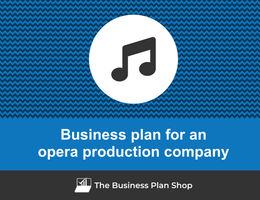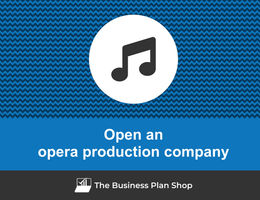How to create a financial forecast for an opera production company?
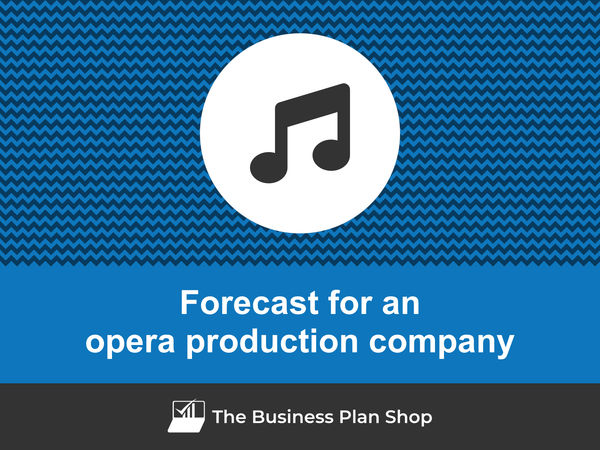
If you are serious about keeping visibility on your future cash flows, then you need to build and maintain a financial forecast for your opera production company.
Putting together an opera production company financial forecast may sound complex, but don’t worry, with the right tool, it’s easier than it looks, and The Business Plan Shop is here to guide you.
In this practical guide, we'll cover everything you need to know about building financial projections for your opera production company.
We will start by looking at why they are key, what information is needed, what a forecast looks like once completed, and what solutions you can use to create yours.
Let's dive in!
Why create and maintain a financial forecast for an opera production company?
The financial projections for your opera production company act as a financial blueprint to guide its growth with confidence and ensure its long-term financial viability.
To create them, you will need to look at your business in detail - from sales to operating costs and investments - to assess how much profit it can generate in the years to come and what will be the associated cash flows.
During challenging market conditions, maintaining an up-to-date financial forecast enables early detection of potential financial shortfalls, allowing for timely adjustments or securing financing before facing a cash crisis.
Your opera production company's financial forecast will also prove invaluable when seeking financing. Banks and investors will undoubtedly request a thorough examination of your financial figures, making precision and presentation essential.
Need a convincing business plan?
The Business Plan Shop makes it easy to create a financial forecast to assess the potential profitability of your projects, and write a business plan that’ll wow investors.

What information is used as input to build an opera production company financial forecast?
A opera production company's financial forecast needs to be built on the right foundation: your assumptions.
The data required to create your assumptions will depend on whether you are a new or existing opera production company.
If you are creating (or updating) the forecast of an existing opera production company, then your main inputs will be historical accounting data and operating metrics, and your team’s view on what to expect for the next three to five years.
If you are building financial projections for a new opera production company startup, you will need to rely on market research to form your go-to-market strategy and derive your sales forecast.
For a new venture, you will also need an itemised list of resources needed for the opera production company to operate, along with a list of equipment required to launch the venture (more on that below).
Now that you understand what is needed, let’s have a look at what elements will make up your opera production company's financial forecast.
The sales forecast for an opera production company
The sales forecast, also called topline projection, is normally where you will start when building your opera production company financial forecast.
Creating a coherent sales projection boils down to estimating two key drivers:
- The average price
- The number of monthly transactions
To do this, you will need to rely on historical data (for an existing business), market research data (for both new and existing opera production companies), and consider the elements below:
- Pricing of tickets: The average price of tickets for opera productions can greatly impact the number of monthly transactions. If your opera company offers premium seating options at a high price, it may attract a smaller but wealthier audience. On the other hand, if you offer more affordable tickets, you may see a higher volume of monthly transactions from a wider range of audience members.
- Overall economic conditions: The state of the economy can have a significant impact on the average price and number of monthly transactions for your opera productions. During an economic downturn, people may be less likely to splurge on expensive tickets, resulting in a decrease in average price and transactions. Alternatively, during an economic boom, people may have more disposable income to spend on entertainment, resulting in an increase in average price and transactions.
- Popularity of opera: The popularity of opera as an art form can also affect the average price and number of monthly transactions for your company. If opera is currently in high demand, you may be able to charge a higher price for tickets and see an increase in monthly transactions. However, if opera is not as popular, you may need to lower your prices to attract a larger audience and maintain a steady flow of transactions.
- Competition: The presence of other opera production companies in your area or region can also impact your average price and number of monthly transactions. If you are the only company offering opera productions, you may be able to charge higher prices and see a higher volume of transactions. However, if there are multiple companies competing for the same audience, you may need to lower your prices to stay competitive and maintain a steady flow of transactions.
- Seasonal demand: The demand for opera productions may vary throughout the year, which can affect your average price and number of monthly transactions. For example, during the holiday season, people may be more inclined to attend festive productions, resulting in a higher average price and number of transactions. On the other hand, during the summer months when people may be on vacation or attending outdoor events, you may see a decrease in demand and need to adjust your prices accordingly.
After the sales forecast comes the operating expenses budget, which we will now look into in more detail.
Need a convincing business plan?
The Business Plan Shop makes it easy to create a financial forecast to assess the potential profitability of your projects, and write a business plan that’ll wow investors.

The operating expenses for an opera production company
The next step is to estimate the costs you’ll have to incur to operate your opera production company.
These will vary based on where your business is located, and its overall size (level of sales, personnel, etc.).
But your opera production company's operating expenses should normally include the following items:
- Production Staff Salaries: This includes the salaries of directors, conductors, stage managers, designers, and other production staff who are responsible for putting on the opera.
- Cast Salaries: Opera companies must pay their singers and performers for their time and talent.
- Rehearsal Space Rental: The opera company may need to rent a space for rehearsals if they do not have their own dedicated rehearsal space.
- Costume and Set Design: This includes the cost of creating and purchasing costumes and set pieces for the production.
- Orchestra Fees: If the opera company does not have their own orchestra, they will need to pay for the services of a professional orchestra.
- Venue Rental: The opera company may need to rent a performance venue for the production.
- Marketing and Advertising: To promote the production, the opera company will need to invest in marketing and advertising efforts such as print ads, social media ads, and flyers.
- Ticketing Fees: If the opera company uses a ticketing platform, they will need to pay fees for each ticket sold.
- Accountancy Fees: To ensure proper financial management, the opera company may need to hire an accountant or pay for accounting services.
- Insurance Costs: Opera productions involve many moving parts, so the company will need to invest in insurance to protect against potential risks.
- Software Licenses: The opera company may need to purchase software for ticketing, accounting, or other business operations.
- Banking Fees: To manage financial transactions, the opera company will need to pay fees for banking services.
- Travel Expenses: If the production involves touring or bringing in out-of-town performers, the opera company will need to cover travel expenses.
- Legal Fees: To protect their intellectual property and handle any legal issues, the opera company may need to hire a lawyer or pay for legal services.
- Utilities: The opera company will need to cover the cost of utilities such as electricity, water, and gas for their rehearsal and performance spaces.
This list is not exhaustive by any means, and will need to be tailored to your opera production company's specific circumstances.
What investments are needed to start or grow an opera production company?
Creating and expanding an opera production company also requires investments which you need to factor into your financial forecast.
Capital expenditures and initial working capital items for an opera production company could include elements such as:
- Opera House/Performance Venue: This includes the purchase or construction of a physical space dedicated to opera performances, such as an opera house or theater. This can also include renovations or upgrades to an existing space to meet the technical and aesthetic requirements of an opera production.
- Stage Equipment: This includes fixed assets such as stage lighting, sound systems, and rigging equipment. These are essential for creating the immersive atmosphere and technical effects required for opera performances.
- Costumes and Props: Opera productions often require elaborate costumes and props to accurately depict the time period and setting of the opera. These items can be expensive and may need to be custom-made or rented from specialty suppliers.
- Musical Instruments: An opera production company may need to purchase or rent musical instruments, such as a grand piano or orchestral instruments, for live performances. These items can be costly and may require regular maintenance and tuning.
- Set Design and Construction: Opera productions often require elaborate and detailed sets to transport the audience to the world of the opera. This includes the design, construction, and installation of set pieces, backdrops, and special effects.
Again, this list is not exhaustive and will need to be adjusted according to the circumstances of your opera production company.
Need a convincing business plan?
The Business Plan Shop makes it easy to create a financial forecast to assess the potential profitability of your projects, and write a business plan that’ll wow investors.

The financing plan of your opera production company
The next step in the creation of your financial forecast for your opera production company is to think about how you might finance your business.
You will have to assess how much capital will come from shareholders (equity) and how much can be secured through banks.
Bank loans will have to be modelled so that you can separate the interest expenses from the repayments of principal, and include all this data in your forecast.
Issuing share capital and obtaining a bank loan are two of the most common ways that entrepreneurs finance their businesses.
What tables compose the financial plan for an opera production company?
Now let's have a look at the main output tables of your opera production company's financial forecast.
The projected profit & loss statement
The projected profit & loss shows how profitable your opera production company is likely to be in the years to come.
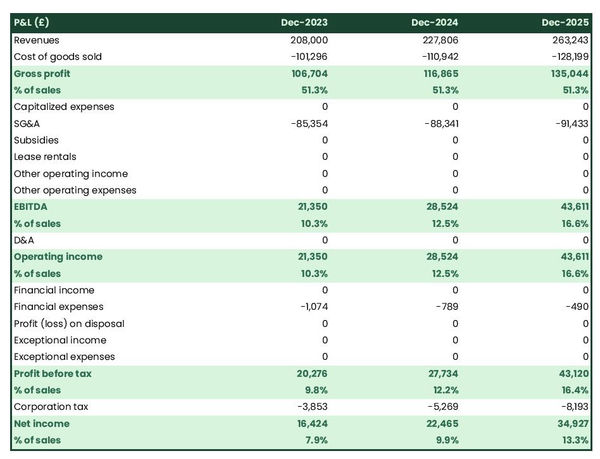
For your opera production company to be financially viable, your projected P&L should ideally show:
- Sales growing above inflation (the higher the better)
- Profit margins which are stable or expanding (the higher the better)
- A net profit at the end of each financial year (the higher the better)
This is for established opera production companies, there is some leniency for startups which will have numbers that will look a bit different than existing businesses.
The projected balance sheet
The projected balance sheet gives an overview of your opera production company's financial structure at the end of the financial year.
It is composed of three categories of items: assets, liabilities and equity:
- Assets: are what the business possesses and uses to produce cash flows. It includes resources such as cash, buildings, equipment, and accounts receivable (money owed by clients).
- Liabilities: are the debts of your opera production company. They include accounts payable (money owed to suppliers), taxes due and bank loans.
- Equity: is the combination of what has been invested by the business owners and the cumulative profits to date (which are called retained earnings). Equity is a proxy for the value of the owner's stake in the business.
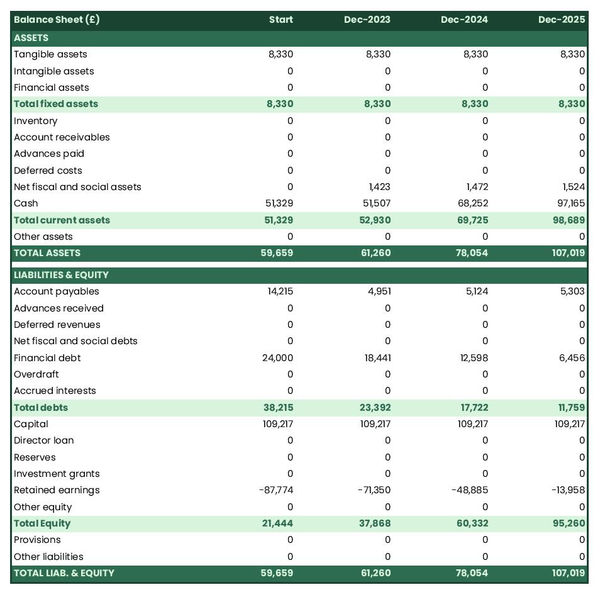
The cash flow forecast
Your opera production company's cash flow forecast shows how much cash your business is expected to consume or generate in the years to come.
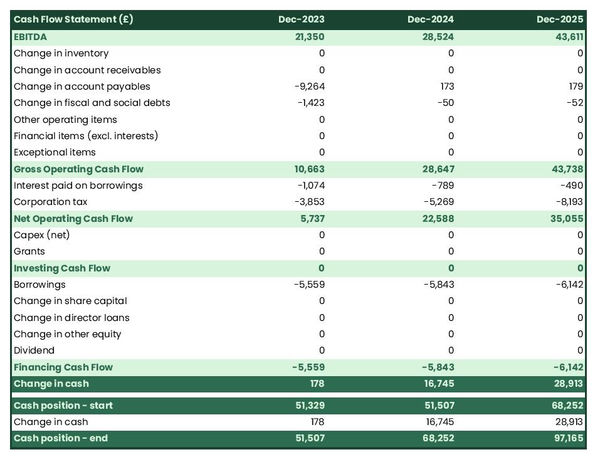
It is best practice to organise the cash flow forecast by nature to better explain where cash is used or generated by the opera production company:
- Operating cash flow: shows how much cash is generated by the operating activities
- Investing cash flow: shows how much will be invested in capital expenditure to maintain or expand the business
- Financing cash flow: shows if the business is raising new capital or repaying financiers (debt repayment, dividends)
Keeping an eye on (and regularly updating) your opera production company's cash flow forecast is key to ensuring that your business has sufficient liquidity to operate normally and to detect financing requirements as early as possible.
If you are trying to raise capital, you will normally be asked to provide a monthly cash flow forecast in your opera production company's financial plan - so that banks or investors can assess seasonal variation and ensure your business is appropriately capitalised.
Need a convincing business plan?
The Business Plan Shop makes it easy to create a financial forecast to assess the potential profitability of your projects, and write a business plan that’ll wow investors.

Which tool should you use to create your opera production company's financial forecast?
Creating your opera production company's financial forecast may sound fairly daunting, but the good news is that there are several ways to go about it.
Using online financial forecasting software to build your opera production company's projections
The modern and easiest way is to use professional online financial forecasting software such as the one we offer at The Business Plan Shop.
There are several advantages to using specialised software:
- You can easily create your financial forecast by letting the software take care of the financial calculations for you without errors
- You have access to complete financial forecast templates
- You get a complete financial forecast ready to be sent to your bank or investors
- You can easily track your actual financial performance against your financial forecast, and recalibrate your forecast as the year goes by
- You can create scenarios to stress test your forecast's main assumptions
- You can easily update your forecast as time goes by to maintain visibility on future cash flows
- You have a friendly support team on standby to assist you when you are stuck
- It’s cost-efficient and much cheaper than using an accountant or consultant (see below)
If you are interested in this type of solution, you can try our forecasting software for free by signing up here.
Calling in a financial consultant or chartered accountant
Enlisting the help of a consultant or accountant is also a good way to obtain a professional opera production company financial forecast.
The downside of this solution is its cost. From experience, obtaining a simple financial forecast over three years (including a balance sheet, income statement, and cash flow statement) is likely to cost a minimum of £700 or $1,000.
The indicative cost above, is for a small business, and a forecast is done as a one-shot exercise. Using a consultant or accountant to track your actuals vs. forecast and to keep your financial projections up to date on a monthly or quarterly basis will cost a lot more.
If you opt for this solution, make sure your accountant has in-depth knowledge of your industry, so that they may challenge your figures and offer insights (as opposed to just taking your assumptions at face value to create the forecast).
Why not use a spreadsheet such as Excel or Google Sheets to build your opera production company's financial forecast?
You and your financial partners need numbers you can trust. Unless you have studied finance or accounting, creating a trustworthy and error-free opera production company financial forecast on a spreadsheet is likely to prove challenging.
Financial modelling is very technical by nature and requires a solid grasp of accounting principles to be done without errors. This means that using spreadsheet software like Excel or Google Sheets to create accurate financial forecasts is out of reach for most business owners.
Creating forecasts in Excel is also inefficient nowadays:
- Software has advanced to the point where forecasting can be done much faster and more accurately than manually on a spreadsheet.
- With artificial intelligence, the software is capable of detecting mistakes and helping decision-making.
Spreadsheets are versatile tools but they are not tailor-made for reporting. Importing your opera production company's accounting data in Excel to track actual vs. forecast is incredibly manual and tedious (and so is keeping forecasts up to date). It is much faster to use dedicated financial planning tools like The Business Plan Shop which are built specially for this.
Need a convincing business plan?
The Business Plan Shop makes it easy to create a financial forecast to assess the potential profitability of your projects, and write a business plan that’ll wow investors.

Use our financial projection templates for inspiration
The Business Plan Shop has dozens of financial forecasting templates available.
Our examples contain both the financial forecast, and a written business plan which presents, in detail, the company, the team, the strategy, and the medium-term objectives.
Whether you are just starting out or already have your own opera production company, looking at our template is always a good way to get ideas on how to model financial items and what to write when creating a business plan to secure funding.
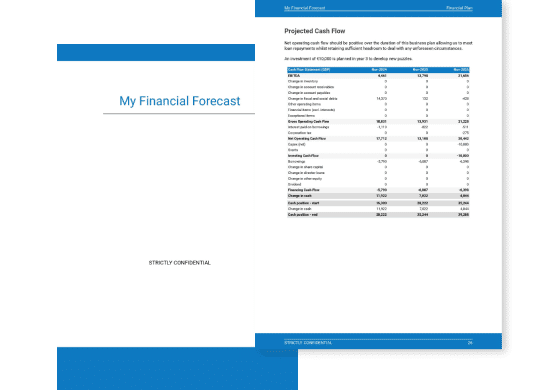
Takeaways
- A financial projection shows expected growth, profitability, and cash generation for your business over the next three to five years.
- Tracking actuals vs. forecast and keeping your financial forecast up-to-date is the only way to maintain visibility on future cash flows.
- Using financial forecasting software makes it easy to create and maintain up-to-date projections for your opera production company.
You have reached the end of our guide. We hope you now have a better understanding of how to create a financial forecast for an opera production company. Don't hesitate to contact our team if you have any questions or want to share your experience building forecasts!
Need a convincing business plan?
The Business Plan Shop makes it easy to create a financial forecast to assess the potential profitability of your projects, and write a business plan that’ll wow investors.

Also on The Business Plan Shop
- Example of financial projections
- Example of financial forecast for business idea
- How to create a turnover forecast for a business?
Know someone who runs or wants to start an opera production company? Share our financial projection guide with them!


